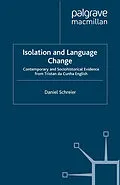Extremely isolated communities offer 'laboratory conditions' for examining the processes of language change and dialect formation. This book presents findings of the first-ever ethnographic fieldwork on the most remote island in the world with a permanent population, Tristan da Cunha. It documents the historical formation of a unique local dialect and investigates the sociolinguistic mechanisms that underlie dialect contact and new-dialect formation. It also uncovers the linguistic consequences of post-insularity - language change processes as a result of increasing contacts with other communities and speakers. Researchers and students of language variation will find this book a unique resource.
Autorentext
DANIEL SCHREIER is an Assistant Professor of Linguistics at the University of Regensburg, Germany. He has published extensively on contact linguistics and new-dialect formation and has taught and lectured in Switzerland, the USA and in New Zealand.
Inhalt
Acknowledgements Introduction Contact, Isolation and Language Change: A Theoretical Framework Tristan da Cunha Methodology and Fieldwork Determining Input Interaction - Present Tense Concord Categoricality and Homogenisation - Present/past be regularisation Dynamism vs Retention - Completive done Innovation and Independent Developments - useta went Conclusion Notes Appendix: Some Phonetic and Phonological Aspects of Tristan da Cunha English Bibliography Index
